
When Labor was returned to government in a landslide win in the
Western Australian elections of April 1933, again under the
leadership of Phillip Collier, Alex McCallum resumed his previous
ministerial posts (except trading concerns) while also taking on
the additional responsibilities of Deputy Premier.
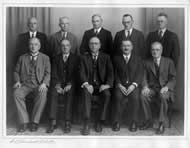
Second Collier Government, 1933.
Standing: J.J. Kenneally, F.M. Troy, Harold Millington, William Kitson, Frank Wise. Seated: J.M. Drew, Alex McCallum (Deputy),
Philip Collier (Premier), J.C. Willcock, S.W. Munsie.
John Curtin Prime Ministerial Library.
Records of Alex McCallum. Second Collier Government, Western
Australia 1933. JCPML00830/4
 Coping with the Depression - Public works, Loan Council
meetings and moves for secession
Coping with the Depression - Public works, Loan Council
meetings and moves for secession
The new Labor Government in Western Australia immediately fostered relief schemes that would 'contribute to the State's economic development, use local material and absorb the greatest number of unemployed', including skilled workers. [1] McCallum announced an initial bout of relief works in May 1933:
The scheme provides for dredging Geraldton harbour, reclamation work near the Perth Causeway, reconditioning of the wall protecting the fishing boat jetty at Fremantle, a drain to complete the Waroona drainage and irrigation schemes, re-sleepering operations in various parts of the Government's railways system and provision of plant at Spencers Brook and Merredin for the washing of sheep and cattle trucks.
'New relief works', West Australian, 19 May 1933 [2]
Works on Bunbury harbour, improvements to the Armadale-Pinjarra road and to several metropolitan bridges, and a gravitation scheme for the Collie water supply were all announced later the same month.
In June McCallum and Premier Collier attended the Premiers' Conference in Melbourne where Western Australia was granted an increase in its allowed deficit under the Premiers' Plan. [3] McCallum also attended the Commonwealth Transport Conference as his time allowed but noted that 'nothing of any practical value was accomplished'. [4]
In August, McCallum pushed to bring in amendments to the Roads
Districts Act and Municipal Corporations Act in relation to the
qualifications of electors and to abolish plural voting, promising
wider powers to these bodies if they became more truly
representative. The bill was rejected by the Legislative
Council.
The next phase of work in the Hills
water supply scheme, the construction of a dam on the Canning
River, was announced by Alex McCallum in September 1933. [5]
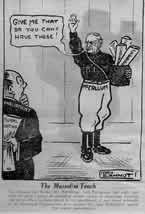
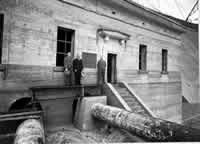
Left: Cartoon
'The Mussolini touch'.
' The Minister for Works (Mr McCallum) told Parliament last night
that until his party's policy of abolishing plural voting in
municipal elections was given effect to, there would be no
amendment of any broad principle of the Municipal Corporations Act
- despite the local authorities appeal for urgent
amendments.' [6]
Right: Alex McCallum at Canning Dam,
September 1933. A commemorative plaque at the dam reads
'Metropolitan Water Supply. Canning Dam. This tablet was unveiled
by The Hon Alex McCallum M.L.A. Minister for Public Works to
commemorate commencement of construction, September 1933. E.
Tindale, M.Inst.C.E. Director of Public Works; R.J. Dumas,
M.Inst.C.E. Constructing Engineer.'
John Curtin Prime Ministerial Library.
Records of Alex McCallum. Alex McCallum at Canning Dam, September
1933. JCPML00830/33
McCallum represented WA once more at the November 1933 Loan Council meeting in Melbourne to complete arrangements for the loans programs agreed to at the June meeting. On his return to Perth, he raised the issue of WA seceding from the Commonwealth if its needs for funding were not met. At the time of the 1933 State election, the Collier Government was faced with 'the conundrum of dealing with a referendum result, held simultaneously with the election, which saw Western Australians vote overwhelmingly for secession from the Commonwealth of Australia, despite it being against the express policy of the government they had just voted into power'. [7] Given the situation, McCallum took care not to take sides on the issue when speaking publicly.
Stressing the need for a fixed annual Federal grant to the smaller States, the Deputy Premier of Western Australia (Mr McCallum), who is on his way back to the West after having attended the Loan Council meeting in Melbourne, said that anyone who looked lightly on the secession movement in the West made a big mistake. He said that it was desirable that the smaller States should receive a fixed annual grant commensurate with the disadvantages they suffered under the Federal system... There was no doubt about the determination of the secessionists in the West. In the forefront of the movement were four leading King's Counsel - one of them a former Premier and former Agent-General and at the moment the leader of the West Australian bar.
'WA's claim for grant. Secession move still strong', West Australian, 13 November 1933 [8]
January 1934 saw Alex McCallum and other government Ministers in Esperance to celebrate the driving of the first pile of a new jetty to replace the existing shallow and dangerous structure and to allow large steamers to use the Port. Before their return to Perth, a violent riot between foreign workers and local miners erupted at Boulder in the Goldfields, with one foreigner killed and several miners injured. Along with Kenneally, Minister for Employment, McCallum was called to Kalgoorlie to assist in resolving the situation. [9]
Alex McCallum and Premier Collier attended meetings of the Premiers Conference and Loan Council in Melbourne once more in mid February 1934. In powerful addresses, the Premiers of South Australia, Western Australia and Tasmania threatened to secede from the Commonwealth unless the smaller states were treated more equitably in financial matters. [10] There was a vigorous airing of views and the Commonwealth agreed to guarantee annual grants for a fixed period to see the States through the Depression years.
Disappointing as it may be, the failure of the Conference to agree on the major issues was no surprise to us, as neither the Premier (Mr Collier) nor I anticipated that much good would result from the discussion' said the Minister for Works (Mr A McCallum)...I think, however, that good will eventually result from the discussions, as never before has the Federal Government been subjected to such a sustained attack. For six days the States bombarded the Federal Government with facts and figures to show how Federal policy had increased the difficulties of the States.
'Premiers' Conference. Review by Mr McCallum', West Australian, 7 March 1934 [11]
In April the Collier Government put forward its Secession Bill, proposing that a delegation be sent to London to act with the Agent-General to put the case for secession before the Imperial Parliament. As expected, the British Parliament did not accept the petition and support for secession in WA gradually receded .
The Loan Council met yet again in Melbourne in June 1934, with the Premier and McCallum once more heading east. This time, despite criticisms of the Commonwealth Bank Board's attitude on the suggested open bill market, McCallum was able to say that 'so far as Western Australia was concerned, the results of the Loan Council meeting must be regarded as satisfactory.' [12]
As part of the Collier Government's ongoing program of public works, work began in late 1924 on extensions to the metropolitan sewerage scheme which were designed to change the system from river to ocean outfall, thus eliminating sewerage effluent from the Swan River. The works were completed in late 1936. [13]
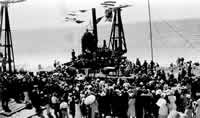
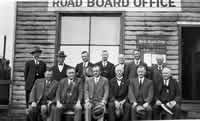
Left: Alex McCallum at the driving of the
first pile for the new jetty at Esperance, January 1934.
John Curtin Prime Ministerial Library.
Records of Alex McCallum. Alex McCallum at the driving of the first
pile for the new jetty at Esperance, January 1934.
JCPML00830/168
Right: Alex McCallum and others in
front of the Upper Blackwood Road Board office, 1930s
John Curtin Prime Ministerial Library.
Records of Alex McCallum. Alex McCallum and others in front of the
Upper Blackwood Road Board office, 193? JCPML00830/39

Acting Premier
There were serious issues surrounding Collier as leader in his second term as Premier. Although he was popular with the electorate, his health problems, exacerbated by heavy drinking, resulted in frequent absences and made him difficult to work with. McCallum carried an increasingly heavy load as Deputy and was Acting Premier (and Treasurer) for some months in 1934-35 during Collier's lengthy illness and rehabilitation. [14] The holiday of three months or more forced on the Premier (who was also Treasurer) meant that a Cabinet reshuffle was needed to take some of the load off Deputy Premier McCallum, and Labour went to Kenneally and Works and Water Supply to Willcock. [15]
On a happier note, October 1934 also saw the State celebrating the visit of the Duke and Duchess of Gloucester with a round of parades, balls, garden parties, luncheons and official receptions.
McCallum was also fighting allegations made about him by T J Hughes, Labor MLA for East Perth, who had fallen out with McCallum over the 1924 Fremantle waterfront dispute. Hughes brought charges alleging an offence against the electoral act relating to the publication of an election pamphlet containing false information about Hughes in the Legislative Council elections of 1934. In late November, the charges were dismissed by the presiding magistrate. [16]
Premier Collier returned to take up duties again in February 1935. By mid year, the efforts of the Labor government had succeeded in turning the economy of the State around. [17] These busy and stressful years took their toll on Alex McCallum. It was time for a career change:
'I would not live over again for anything the last few years of my life,' said the Minister for Works (Mr McCallum).... 'My private home life has been destroyed. I was afraid to go home because of the innumerable callers on me who wanted me to get them jobs'.
'A politician's life', West Australian, 19 March 1935 [18]
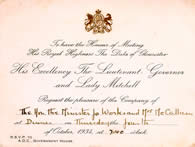
Invitation to Alex and Bessie McCallum to dine at Government House with the Duke of Gloucester, 1934.
John Curtin Prime Ministerial Library. Records of Alex McCallum. Invitation to dinner in honour of HRH Duke of Gloucester, Government House, 4 October 1934. JCPML00821/21
|
|
|
|
|||
|
|
|||

